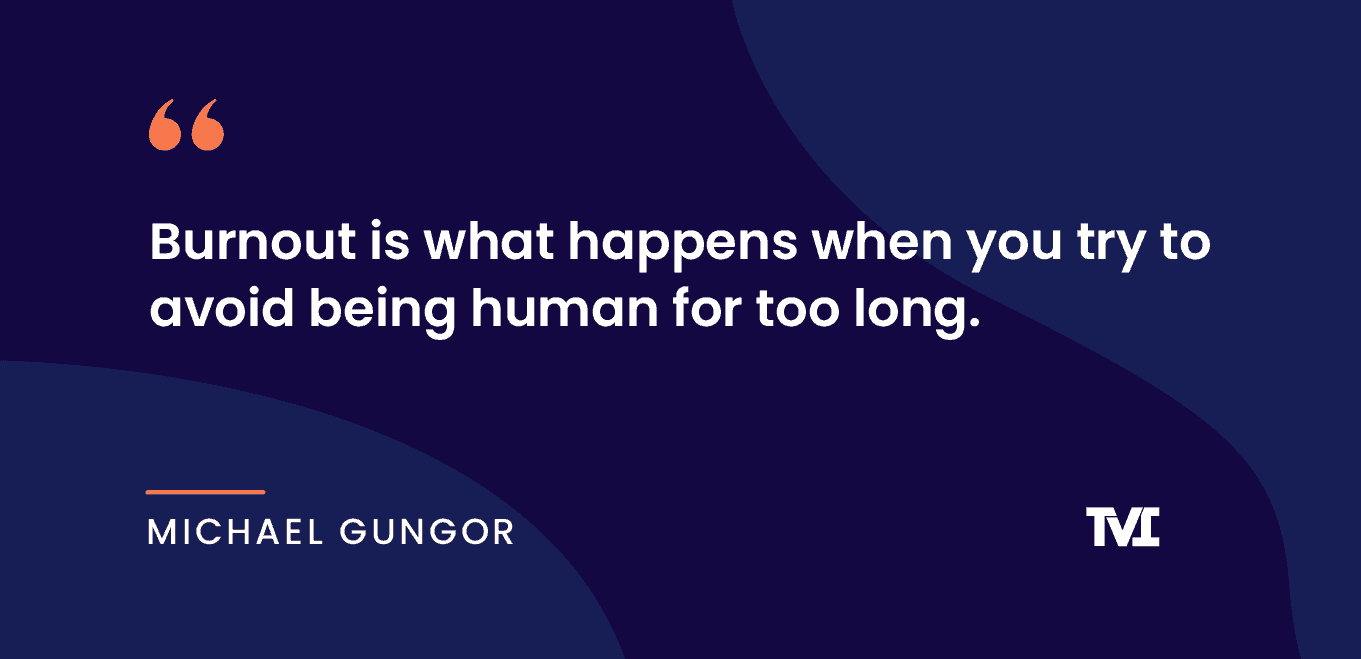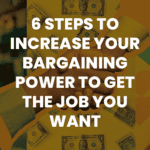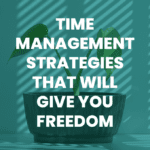Table of Contents
When I landed a full-time job in Boston, I felt like I hit the jackpot.
At the time, I was waitressing 40+ hours per week and freelancing for local businesses on the side, all while religiously applying to full-time jobs.
In January 2014, I got my first “big” job offer—a marketing director position for a small programming bootcamp. It paid $72,000 and came with health insurance and $3,000 in relocation assistance. This was more than exciting to a 23-year-old, who had just dropped out of college and felt trapped because of it.
Today, $72,000 hardly feels like a lot, yet, at the time, it was the most money I’d ever received for doing something that I actually enjoyed doing.
Seemingly overnight, my career had taken a dramatic turn for the best, and for the first time ever, I felt like I had “made it.”
Making it soon turned into losing it, and signs of burnout quickly followed.
In 2014, content marketing was still very new, and the overwhelming majority of companies just didn’t get it. (Many still don’t.)
To these startups, content marketing meant blogging about your company every day. The thing is that’s not content marketing; it’s PR, and it doesn’t work.
My boss, who was a developer, didn’t comprehend this. He didn’t know how to write, or how long a good post took to create, and to be frank, he didn’t care.
Instead, he expected me, a one-woman marketing show with no budget, to: publish daily, promote posts, be active on Slack, attend after-hours’ events—not to enjoy myself but to “capture” a story for the blog… with a party full of drunk brogrammers—ghostwrite for him, network with other companies, manage PR, and do a zillion other things that no one person could possibly do on their own without ample resources.
To make matters worse, I worked in a small, open, chaotic office. So, I was not only distracted by chatter online but also distracted by the 30+ people in the office daily, which meant constant interruptions.
I couldn’t write or get anything done to save my life, because I was being pulled in so many directions.
To my former boss, it wasn’t enough to simply create epic content. He expected me to publish epic content every single day, all while doing nine million other things, like pick up donuts on a Saturday.
In less than three months, I lost my job—and by lost, I mean I was fired—with only one month’s pay as severance.
If I didn’t sleep those first three months, I surely didn’t sleep after them.
Before I ran out of money, I was able to score a bunch of freelance gigs to sustain my income. I designed infographics, built WordPress websites, wrote a lot, and took on every project that came my way. I never said no, because I was always petrified I wouldn’t have enough work.
For nearly three years, I logged 18-hour days, dividing my time amongst client work, personal branding, and cold outreach so I could—you guessed it—get more work.
And then, because I’m clearly a masochist, I decided to restart the startup I failed at building a few years prior.
Everyone around me was so motivated and impressive, and it brought out the most overachieving person in me. Regardless of what I did, though, I just couldn’t seem to dig myself out of this cycle of exhaustion. And honestly, I didn’t try, because I saw no alternative road to success.
Little did I know (or believe) that I was on a fast path to burnout. I really wish I had known because spotting the signs of burnout early can help you avoid this condition altogether (and perhaps save your career in the process).
So you don’t end up making the same mistake I did, I’ve gone through some of the most common signs of burnout in this article, and my top tips to deal with it. Keep an eye out for these burnout symptoms, and if any of them sound familiar, take action now to protect your mental health.
Related:
Burn out meaning: A quick definition
Burn out happens when someone becomes so stressed or overworked, they risk having a mental or physical breakdown.
The term stems from a more material use of the word—when a piece of machinery goes through all of its fuel, it “burns out.” The machine can no longer keep producing because it has no way to energize itself.
This can happen to us mentally and physically. When you’re in the final stages of burnout, you may feel completely unmotivated, irritable, depressed, anxious, or zombie-like. (We’ll go over the signs of burnout that happen before this stage in the rest of this article.)
Though the concept of mental/physical burnout has been around for decades, awareness of the problem has increased over the last few years as workers and employers have called more attention to the importance of well-being at work. It’s important to note that burnout can happen outside of the workplace, too. Anything that requires too much of your physical or mental capacity can lead to burnout—whether that’s caring for a loved one, working through a problematic relationship, or pushing yourself too hard on a personal project.
Related:
Signs of burnout: Does this sound like you?
A lack of satisfaction and motivation
This is probably the most common sign of burnout, and it’s at the top of my list because it’s the one you will perhaps recognize first, if you’re being vigilant.
In order to be successful at what you do, you must feel motivated to produce work, and you must walk away feeling satisfied with what you did and how it was acknowledged by your managers or colleagues.
Unfortunately, if you’re being overworked, there’s a good chance that the quality of your work will suffer. As a result, you will begin to feel less accomplished, and you’ll be less likely to receive that crucial positive feedback from your employer.
When your company expects too much of you, it’s easy to lose your feeling of motivation. Why pour yourself into a job where you aren’t even getting feedback, let alone monetary compensation for all the hard work you’re doing?
If you’re waking up for work and feeling depressed, like you have to drag yourself into the office (even if it your office is in your home), that’s a big sign of burnout you need to acknowledge.
Regularly feeling run down or sick
Burnout can affect your physical body just as much as it impacts your mind. There’s no doubt that too much stress can seriously impact our health, keeping us from sleeping or eating well.
As a result, people who are burnt out often say they feel run down at the end of the workday—they don’t want to do much besides sit around and veg out, and their mind will feel foggy a lot of the time.
As you continue down the path toward total burnout, it’s very likely that you’ll start to feel physically ill. Even if you spend most of your workday sitting down, your body still needs time to rest away from work. If you don’t do this enough, your immune system will suffer, making it much easier to catch a bug that will force your body to take a rest.
Note: If you are feeling sick, from burnout or anything else, the very worst thing you can do is force yourself to keep working. Don’t ignore signs from your body—when you’re run down, it’s time to step away and get rest.
Feeling cynical and jaded
This was a big one for me when I was experiencing burnout. It’s very easy to start feeling cynical all the time—and that has knock-on effects when it comes to your overall mental health.
When you feel cynical, you start to suspect that your colleagues or the company you work for doesn’t care about you or your wellness—they only care about themselves, their own jobs, or the income you can generate.
This may actually be true; companies that allow their employees to burn out aren’t doing a very good job of showing those employees they care about them. But as you become more burnt out, these feelings will grow, even if they aren’t fully justified.
For example, you may find yourself dreading phone calls from your own manager, because you know they’ll want to give you more work. But this manager may not be aware that you’re burning out, or they may be under pressure from their own managers. Your cynicism may be (unjustly) targeted at them, simply because as our feelings of burnout grow, so do our feelings of being jaded with our jobs.
Daydreaming about a different life
What happens when you’re stuck in a burnout situation and can’t find your way out? Naturally, your brain starts to take you somewhere else—anywhere that feels healthier, safer, and more manageable than reality.
When I was suffering from burnout, I would lay in bed at night and fantasize about other jobs I might have had. I used to ask myself: Was waiting tables really so bad, compared to this? Would it be worth it to go back to that even if it meant taking a pay cut, just so I can get some rest?
You may also find yourself having more unrealistic fantasies, like quitting your job in a blaze of glory and working on a sailboat in the Maldives. You might listen to your friends talk about their jobs, and daydream about quitting yours and joining them.
There’s nothing wrong with daydreaming—it’s perfectly natural to imagine a different life. But if you’re doing it all the time, because you really dread your job, then that’s a sign of burnout you need to look out for.
Angry outbursts at colleagues or loved ones
You probably have heard the term “hangry” before—when you’re so hungry you start snapping at anyone who gets between you and your next meal. This happens because we naturally become irritable when we’re low on energy.
Being burntout means you’re always low on energy (seen the first sign of burnout at the top of this list). So naturally, you’ll be much more irritable when you’re overworked.
This can manifest in a few ways. You may quietly seethe at your desk as you listen to your coworker chew their lunch. You may go off on your boss during your one-on-one meetings, putting your job at risk. Or you might find yourself frequently arguing with your partner, family, or roommates when you’re off the clock.
Watch out—if you’re usually an easy going person, then this change in behavior could definitely signify that you’ve got a one-way ticket to burnout.
Feeling detached and isolated
When I was in the worst stages of burnout, I’d often find myself coming into the office well before anyone else, and leaving long after my colleagues had gone home.
The feelings of burnout always got worse in these moments, because I was suddenly aware of how utterly alone I was under the burden of my workload. As things piled up on my plate, I began to feel more isolated from my colleagues, friends, and family, who just didn’t understand.
Unfortunately, this issue compounds itself. The more isolated and lonely you feel, the more the other signs of burnout will become amplified. If you haven’t taken action to curb your burnout by this stage, be warned: You’re approaching the point of total breakdown.
Burnout stages

Burnout quiz: Are you burned out?
Overcoming Burnout
Recognizing signs of burnout is one thing, but dealing with your burnout is an entirely different ball game.
In some rare cases, burnout will go away on its own. For example, if you’re working on a big project at work that has a specific end date, your burnout may go away once that project is over and your workload has been reduced.
But in the vast majority of cases, dealing with burnout before it becomes a serious problem requires immediate action. Here’s how to deal with it:
Talk to someone about it

When you start to recognize the signs of burnout in yourself, your first course of action should be to talk to someone about it. There’s no need to suffer in silence, and doing so will only make things worse.
Ideally, the person you’ll talk to about this will be able to help you—in a perfect world, your manager at work will listen to what’s going on with you and offer concrete, realistic solutions.
Of course, not all managers are perfect. If you’ve already tried talking to your boss, and they didn’t have solutions, your next course of action may be to go up the chain and talk to your boss’s boss.
If that’s not possible, then you should still find someone—a friend, a therapist, a family member—with whom you can discuss the burnout issue. Not only will this help combat your feelings of isolation, but a new perspective may help you see a solution that you aren’t able to find on your own.
Prioritize your health

If I had prioritized my health during these tough times, I may not have burned out and let my body start falling apart as a result.
Of course, finding time to put your health first isn’t always possible when you’re under pressure with work. In fact, forcing yourself to go to the gym or restricting your diet in the name of health can actually make burnout worse—you’re already exhausted, so don’t overwork your body or deny it fuel and comforting food.
When you start to recognize signs of burnout, take a moment to reflect on what you’re currently doing (or not doing) for your health. Are you staying up too late because of work? Have you given up your daily walks because of deadlines?
While you may have to occasionally sacrifice some personal time for work, this should not be a regular thing. If your company can’t respect your need to take care of yourself physically and mentally, then the best thing you can do is start looking for a new job.
Here are a few articles that might help you take back control and start caring for yourself again:
Change your perspective, and know when to get out

While becoming healthier can help reduce exhaustion, curb cynicism, and improve efficacy, it doesn’t completely solve the root causes of burnout.
It’s extremely likely that the office environment will remain the same. You’ll likely still experience the same impossible workload, unreasonable conflicts, and/or few resources.
Before giving up on the department or company, reflect on your mindset and assumptions. Can you change your outlook on the bad parts of your job?
For example, if you’re suffering from exhaustion, try delegating tasks—even important ones—to give you space to do other important/meaningful projects.
Or, if you’re struggling with cynicism, how can you protect yourself from the parts of the company that bother you while still engaging in your specific role and the enterprise as a whole? Another solution could be to make a few new friends in the office in order to negate the negative relationships.
Maybe you’re feeling ineffective. If this is the case, is there help you could seek out in the form of professional or personal development? And if you’re suffering from a lack of recognition, ponder how you could brand yourself or better showcase the work you’ve been doing.
It can be extremely difficult to tear yourself away from a “good” job—one at a big company with a great reputation that pays well. But, like me, you may realize that values and ethics (and your physical and mental health) mean more to you than any perk ever will.
Reset expectations
To fully address signs of burnout, you must also address high-value activities and relationships that trigger unhealthy levels of stress.

Do this by managing and resetting others’ expectations of you—colleagues, clients, and sometimes family members. Be clear about what and how much you’re willing to take on.
If/when you receive pushback, let them know that these changes are required for your long-term success, productivity, and health. Your manager may feel defensive at first, or skeptical of the reality of your situation. That’s why it’s a good idea to be prepared before you bring up this issue with your colleagues. Gather evidence first by tracking your hours or listing out all your responsibilities.
During the conversation, try to keep a cool head, and avoid laying blame on any one person. Instead, calmly and plainly explain the issue as you see it, and present your boundaries as a solution.
For example, you might say something like, “I really want to be able to focus my attention on the big project due at the end of the month. To do that, I’ll need help managing the time sheets for the team, so I can free up room in my calendar. Is there anyone who might have time to help with that?”
Connect more
One of the best cures for burnout, especially when triggered by cynicism and inefficacy, is making rich connections and focusing on personal and professional development.

Find others who are going through this experience—or have been through this experience before. This may be someone who works with you, or a friend or family member who has had a similar experience with work.
A good mentor can provide guidance on how to overcome burnout. Check out our full guide on how to find a mentor.
You can’t run on empty forever

If you asked me back in 2014 what I wanted to do with my life, you’d have received a passionate response. The short answer would’ve been: Become an altruistic Steve Jobs. Make a massive contribution to the world.
I’m sad to say, just a few years later, I no longer have a passionate response. In fact, it may even sound a bit cynical, and that’s because I’m still recovering from the extreme burnout I experienced for years.
For too many years, I tried to be superhuman. I thought it was the only road to success. I thought I could ignore toxic work environments and coworkers. I thought I could run on empty forever, but as I [painfully] know now, I couldn’t.
I thought burnout was stupid… until it happened to me. Don’t let it happen to you too.








